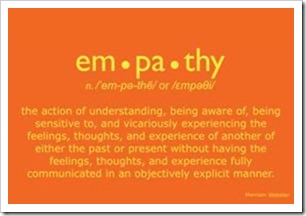
In my work with parents and teachers, I am often asked about empathy and how others develop it. I have decided to combine all the suggestions here. If you are working with children, if you in relationship and would like to develop your own empathy, or if you want to encourage empathy in your students or children, I hope you can make good use of this list.
- People have a brain mechanism called “neuron mirroring” or “Mirror neurons”. This mechanism means that watching someone doing something triggers the same feeling in the observer as the person doing the action. When kids watch their parents, they internally experience the same feelings that their parents are experiencing. If you want to teach a child empathy, be empathetic. The child’s brain will function like a mirror and reflect empathy.
- It is best to let go of the belief that women are better than man at being empathetic. It is not very emphatic towards men and it gets people into lots of trouble.
- Have you ever heard the phrase, “You cannot judge another until you have walked a mile in their shoes”? Try it. Put yourself in another person’s position and ask yourself, “What would I have done if I were in their place?”. Try to mimic their body language and notice what you feel.

- We all like to think we are “right” and that our perspective is the “ultimate truth”. Psychologists call it “myside bias”. In a study done with psychiatrists, psychologists, social workers, and teachers, it was found that when the workers made an assessment, they usually confirmed what they were already thinking before they even saw the patient. This was the case even when the patient never had any problem. We tend to justify our thoughts and give more weight to information which supports what we already think. Consciously let go of the idea that your way is the “right” way. Open yourself to the possibility that there is more than one “right” answer.
- Read fiction novels. In a study conducted by Raymond Mar and colleagues, they found that the more novels an adult reads, the better they score on an empathy test and they better they are at recognizing other’s emotions.
- If it is something you enjoy, try writing a story about someone else. Writing about people requires empathy. In order to create a character, the author has to pretend to be them and to know what they might be thinking.

Empathetically yours,
Ronit













